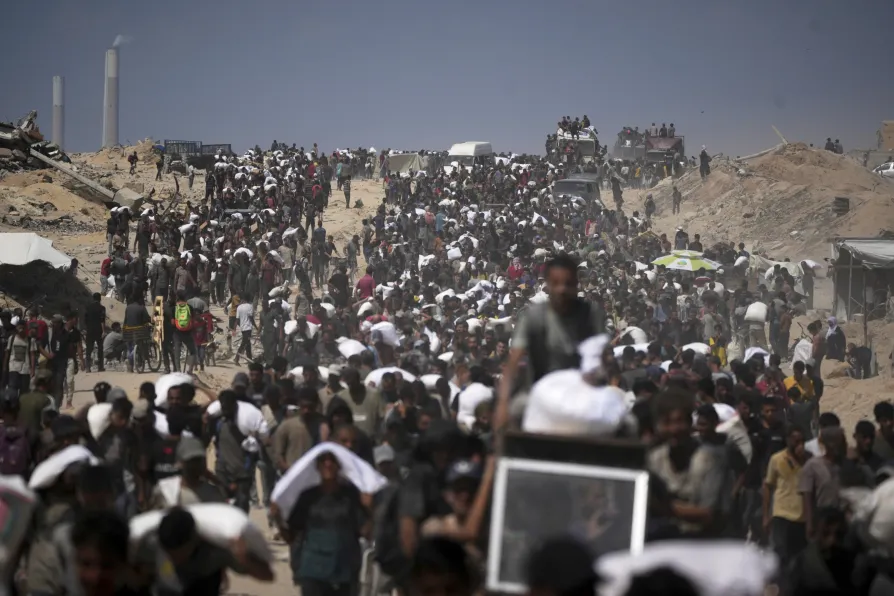SWEE ANG, the founder of Medical Aid for Palestinians, is a big believer in the power of small actions, and she is the living proof it works, writes Linda Pentz Gunter
A statement from rights group Liberation on the question of recognition of a Palestinian state

 Palestinians carry sacks of flour taken from a humanitarian aid convoy en route to Gaza City, in the outskirts of Beit Lahiya, northern Gaza Strip, August 1, 2025
Palestinians carry sacks of flour taken from a humanitarian aid convoy en route to Gaza City, in the outskirts of Beit Lahiya, northern Gaza Strip, August 1, 2025
OF THE 193 countries which make up the United Nations, 147 formally recognise the Palestinian state — which currently has observer status at the UN.
A resolution of the UN general assembly in 1948 called for the establishment of a Jewish state and an Arab state [Palestine], with Jerusalem under UN control, on the territory of what was then British-controlled Palestine.
There has never been any ambiguity or doubt under international law as to whether there should exist a Palestinian state.
However, from the very outset, from the initial partition of Palestine in 1948, the international agreement was flouted by Israel, which has sought to establish an exclusively Jewish state on the territory designated for two states.
The roots of the current crisis in Gaza, and increasingly the West Bank, do not originate in the actions of October 7 2023 but in the original Nakba (“Catastrophe”) in 1948 when 750,000 Palestinians were driven from their homes and off their land by the newly formed state of Israel.
The proposal by British Prime Minister Keir Starmer to recognise a Palestinian state would not be an act of magnanimity or solidarity with the Palestinian people, it would simply be an act which brings Britain into line with international law, long-established UN resolutions, as well as the bulk consensus of world opinion on the issue.
However, the British government, despite massive pressure from MPs across all parties, cannot see its way to accepting UN resolutions and instead proposes to make recognition of Palestine conditional upon Israel meeting key conditions, including reaching a ceasefire as well as committing to a long-term peace process.
The Palestinian people have an inalienable right to their own state on their own land — and this cannot and should not be made conditional in any way, shape, or form.
The case for a ceasefire and for Israel to allow the UN and international aid agencies access to relieve the starvation of Gaza is indisputable.
The case for the Israeli leadership and the Israel Defence Forces (IDF) to ultimately be brought to account before international courts and tried for war crimes is equally indisputable.
Britain should be pressing for justice for the Palestinian people, not scrabbling around in vain for a mitigation for Israeli aggression.
Liberation will continue to campaign, as it has throughout its existence, for unconditional recognition of a Palestinian state based upon the respective UN resolutions.
In relation to the current crisis, we will continue to call for a ceasefire, the withdrawal of the IDF from Gaza, and the cessation of the theft of Palestinian land by so-called “settlers” in the occupied West Bank.
Liberation will continue to press the British government to cease the supply of arms and revoke any licences which support the IDF in its bloody suppression of the Palestinian people.
We believe these demands not only reflect the views of a growing number of MPs but increasingly the popular opinion of the British people, as expressed through the wave of protests against the unrestrained aggression and bombardment unleashed upon Gaza over the last 22 months, the deliberate infliction of starvation upon its people more recently, as well the continued supply of weapons to Israel.
We urge the British government to listen and act, in line with UN resolutions and international law.
For more information about Liberation visit liberationorg.co.uk.










